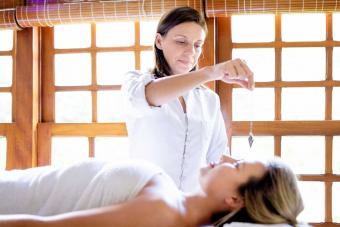
While Western medicine is essential for maintaining good health, complementary holistic and energy healing practices have been gaining a lot of traction in recent years. And when used in combination with traditional health care, these practices can improve the health of your body, mind, and spirit.
One extremely popular type of energy healing is Reiki. This practice originates in Japan, and it uses universal energy that's available to everyone to help balance body, mind, and spirit for overall well-being. There are about a million Reiki practitioners all around the world. Turning to one in conjunction with your regular health care could be helpful.
What Is Reiki?
Reiki is a therapeutic energy healing practice. Mikao Usui created the system, which involves a philosophy, techniques to channel energy, and daily practices. In Japan, the practices are rooted in both Buddhism and Shintoism and as Reiki has spread throughout the world in the past century, different practitioners have also brought Western philosophical and spiritual beliefs into it as well.
The word Reiki comes from the combination of two Japanese words, 'rei' meaning spiritual wisdom or higher power, and 'ki' meaning life force energy. The words come together to mean that a person's internal energy can be guided by spirituality and a higher power.
Spirituality is an important aspect of Reiki. The practice is based on the belief that humans have a life force energy flowing through them. This life force energy is what keeps people alive and healthy. However, Reiki also believes that a person's life force energy can become overactive, underactive, or blocked, which can have negative effects on their emotional, spiritual, mental, and physical health.
The practice itself uses physical touch, also known as the laying on of hands, to help move a person's life force energy through the body. It's a form of complementary medicine that is used to promote mental, physical, and spiritual healing.
How Reiki Is Performed
When a person enters into a Reiki session, they receive a treatment that is meant to help their life force energy move throughout their body. Think of it like a car tune-up. If you notice your car feels a bit off when you drive it, you might take it to a professional to check its alignment. A Reiki session works the same way.
During a session, a Reiki professional gently lays their hands on top of a person's body. In some practices, practitioners don't actually come in contact with a person and simply hover their hands over the body. They feel around the body for sources of high and low energy and guide the energy towards wherever it is needed.
What Reiki Feels Like
People experience a wide variety of responses to Reiki. For example, some people experience feelings of relaxation or being at peace. Others experience physical sensations, such as tingling or tightness. Reiki itself is the practice of moving energy around the body, so people may experience feelings of being more energized or a reduction in their level of fatigue.
Some people also experience physical sensations of being hot or cold, and can even get goosebumps or experience hot flashes. These temperature changes can occur anywhere on the body, especially in the hands. Many people also feel their hands pulsating or experience vibrations.
Every person is different. They have different stressors, ailments they want to heal, and different distributions of energy in the body. This means that no two people will react the same to Reiki.
Different Types of Reiki

The traditional and original form of Reiki originated in Eastern medicine based on Mikao Usui's teachings. However, since its creation, other forms of Reiki have emerged. These different forms of Reiki vary slightly from one another but are all used to promote health and well-being and are rooted in spirituality. Some types of Reiki include:
- Golden Age Reiki - Combines Reiki symbols and traditional Reiki methods with different types of Reiki to create a new healing experience.
- Raku Kei - Known as 'the dragon method', originated in Tibet and makes use of the elements fire, water, air, and ether.
- Rainbow Reiki - Stems from traditional Reiki and also uses new Reiki symbols to focus on karma clearing, crystal healing, and astral projection.
- Tibetan Reiki - Part of the Tibetan Reiki system that unifies the mind and body using the element of fire to light chakras and bring enlightenment.
Reiki Benefits and Effectiveness
Reiki has been used for more than a century as a healing practice in Eastern medicine. People who believe in the practice note that it has been used to reduce stress and help the body heal itself.
According to the National Center for Complementary and Integrative Health, the benefits of Reiki are hard to support with scientific evidence for many reasons. For example, there is currently no way of measuring or proving the existence of life forces in the body. Although several studies have been conducted using Reiki as a healing practice, many of them have been shown to be unreliable and present inconsistent findings.
Possible Benefits of Reiki
Some of the purported benefits of Reiki include:
-
Enhanced quality of life
- Increased rates of happiness
- Increased relaxation
- Promote recovery and healing from sickness and physical injury
- Reduced rates of stress
People who practice Reiki believe that its healing powers are able to help with essentially any illness or injury, whether it's mental, physical, or spiritual. In fact, people who partake in the practice often receive Reiki treatments to supplement medicine and other therapies.
Does Reiki Work?
Reiki has a long history of being used to heal ailments and injuries. In addition, it offers people a holistic approach to medicine that takes into account their entire being. But is there any scientific evidence to support these healing claims?
One systematic review from the Journal of Evidence-Based Integrative Medicine analyzed the results of 13 different studies that used Reiki as a healing practice. Results showed that eight out of the total 13 studies yielded positive health benefits that were greater than placebo conditions. This means that people who experienced Reiki therapy showed lower heart rates, reduced blood pressure, and greater relaxation compared to participants who did not partake in a real Reiki therapy session.
The results from the review support the idea that Reiki activates the parasympathetic nervous system, which can trigger the relaxation response in humans. However, Reiki was found to have the same amount of healing benefits as placebo conditions for studies monitoring the acute pain of participants after undergoing surgery.
More research needs to be done in the field to prove that the practice of Reiki itself has healing benefits. In addition, more research is needed to uncover how Reiki impacts the body and mind to have a positive impact on people's health.
How to Practice Reiki
Reiki sessions are traditionally performed by Reiki practitioners who have been trained in the field of energy healing. That means that you might not be able to practice Reiki on yourself. However, it doesn't mean that you can't get involved with the practice. There are many ways to learn more about Reiki and participate in the practice.
Find a Reiki Practitioner

If you're interested in Reiki as a healing practice, then you might want to experience a Reiki session for yourself. You can find a qualified Reiki practitioner through the International Association of Reiki Professionals (IARP). Find a practitioner in your area and schedule your first session. Monitor how you feel after and see if it's a practice you would like to continue.
Connect to Your Spirituality
Reiki is spiritual in nature, but it is not attached to any specific religion. In fact, people who practice Reiki claim that its benefits can be experienced by people who don't even believe in spirituality or the practice itself. However, you might find it helpful to get in touch with your spirituality. Uncover what spirituality means to you and think about how Reiki could increase your connection.
Become a Reiki Student
Another way to get more involved in the practice of Reiki is to become a Reiki student. You can take different classes on the different types of Reiki, and learn more about the practice itself. You'll learn more about life force energy and how to maintain it at high levels, as well as how to move the energy throughout the body. Check out classes offered at the International Center for Reiki Training to learn more.
A Holistic Healing Approach
Reiki has been used for more than a century as a form of holistic healthcare. Reiki practitioners believe that anyone can benefit from experiencing Reiki, regardless of whether they themselves have a spiritual connection. The practice is open to anyone who is looking for a complementary healing experience. If Reiki sounds like a good fit for you, contact a practitioner or talk to your healthcare provider about seeking treatment.







